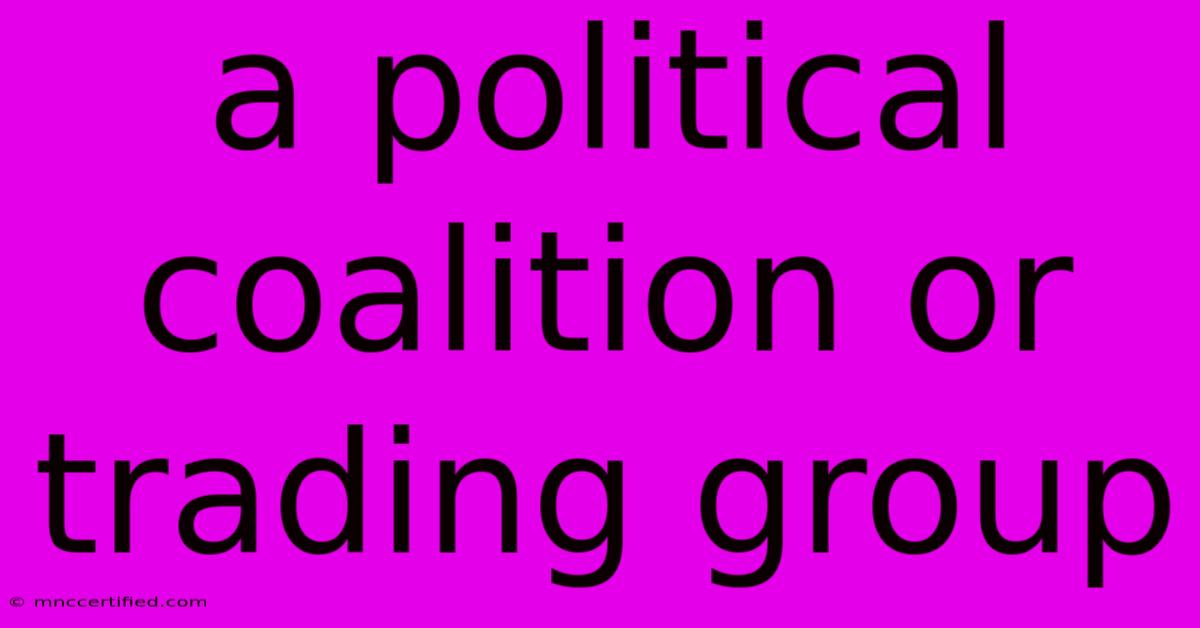A Political Coalition Or Trading Group

Table of Contents
Building Power: The Rise and Fall of Political Coalitions and Trading Groups
In the intricate world of politics and economics, alliances and partnerships are often crucial for achieving desired outcomes. From the grand stage of international relations to the bustling marketplaces of global trade, political coalitions and trading groups emerge as powerful forces shaping the course of events. This article delves into the dynamics of these alliances, exploring their formation, purpose, impact, and the challenges they face.
Political Coalitions: A United Front for Shared Goals
Political coalitions are temporary alliances formed by different political parties or groups to achieve a common objective, often related to electoral success or policy implementation. These alliances can be formed at the national, regional, or local level.
Why Do Political Coalitions Form?
- Increased Electoral Success: By joining forces, smaller parties or factions can pool their resources and support, increasing their chances of winning elections.
- Policy Implementation: Coalitions allow for the implementation of policies that may not have been possible with a single party's majority.
- Stability and Governance: In fragmented political landscapes, coalitions can help foster stability by ensuring a majority government.
- Shared Ideals and Values: Parties with overlapping ideologies or objectives may find common ground in a coalition.
Examples of Successful Coalitions:
- Germany's Grand Coalition: The Christian Democratic Union (CDU) and the Social Democratic Party (SPD) have formed several grand coalitions in recent decades, showcasing the effectiveness of bipartisan collaboration.
- The Rainbow Coalition in South Africa: This alliance brought together diverse political parties, including the African National Congress (ANC), to transition South Africa from apartheid to democracy.
Challenges Faced by Political Coalitions:
- Internal Conflicts: Disagreements over policies, leadership, and resource allocation can lead to internal conflicts and instability within coalitions.
- Lack of Cohesion: Maintaining unity and a shared vision among diverse parties can be challenging.
- Erosion of Trust: Trust between coalition partners can deteriorate over time, particularly when faced with difficult choices.
Trading Groups: Facilitating Trade and Economic Growth
Trading groups are economic alliances formed by countries to promote free trade, reduce tariffs, and facilitate economic cooperation. These groups play a crucial role in shaping global trade patterns and fostering economic growth.
Key Features of Trading Groups:
- Free Trade Agreements: Members agree to eliminate or reduce tariffs and other barriers to trade.
- Harmonized Regulations: Standard regulations and procedures are established to streamline trade processes.
- Joint Trade Promotion: Members collaborate on marketing campaigns and trade missions to promote exports.
- Investment Cooperation: Trading groups may encourage joint investments and infrastructure development.
Examples of Notable Trading Groups:
- The European Union (EU): The EU is the world's largest single market, boasting a free trade zone and common policies across its member states.
- The North American Free Trade Agreement (NAFTA): This agreement established a free trade zone between the United States, Canada, and Mexico.
- The Association of Southeast Asian Nations (ASEAN): ASEAN promotes economic integration and cooperation among its member nations in Southeast Asia.
Challenges Faced by Trading Groups:
- Trade Disputes: Disagreements over trade policies and tariffs can lead to conflicts between member countries.
- Differing Economic Interests: Members may have diverse economic priorities, making it challenging to reach consensus on trade agreements.
- Protectionist Pressures: Political pressures to protect domestic industries can undermine free trade principles.
The Future of Coalitions and Trading Groups
The future of both political coalitions and trading groups is likely to be shaped by evolving global dynamics, including:
- Globalization and Interdependence: Increasing globalization and economic interdependence are likely to drive further integration and collaboration.
- Technological Advancements: Digital technologies are transforming trade and communication, creating new opportunities and challenges for alliances.
- Political Fragmentation and Polarization: Rising nationalism and populism may pose challenges to maintaining international and domestic cooperation.
Conclusion:
Political coalitions and trading groups play vital roles in shaping the political and economic landscape. While they offer significant benefits in terms of stability, prosperity, and cooperation, they also face significant challenges. Understanding the dynamics of these alliances is essential for navigating the complexities of the modern world and effectively addressing global issues.

Thank you for visiting our website wich cover about A Political Coalition Or Trading Group. We hope the information provided has been useful to you. Feel free to contact us if you have any questions or need further assistance. See you next time and dont miss to bookmark.
Featured Posts
-
Lord Mayors Show Central London Traffic Updates
Nov 09, 2024
-
Unladen Insurance For Rv Transport Cost
Nov 09, 2024
-
Buffy The Vampire Slayer Trading Cards
Nov 09, 2024
-
Order Of Friendship Awarded To Russian Kurdish Singer Zara
Nov 09, 2024
-
Voya Accident Insurance Payout Amounts
Nov 09, 2024